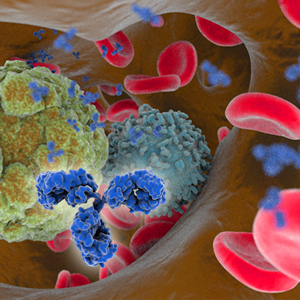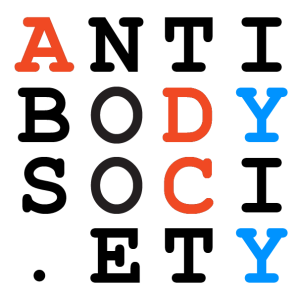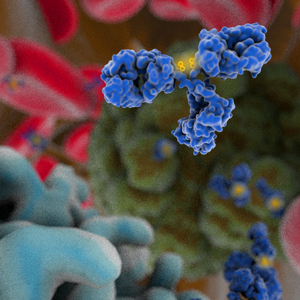 The pace of antibody therapeutics development accelerated in 2017, and this faster pace is projected to continue through 2018. Notably, the annual number of antibody therapeutics granted a first approval in either the European Union (EU) or United States (US) reached double-digits (total of 10) for the first time in 2017. The 10 antibodies granted approvals are: brodalumab, dupilumab, sarilumab, guselkumab, benralizumab, ocrelizumab, inotuzumab ozogamicin, avelumab, duvalumab, and emicizumab. Brodalumab, however, had already been approved in Japan in 2016.
The pace of antibody therapeutics development accelerated in 2017, and this faster pace is projected to continue through 2018. Notably, the annual number of antibody therapeutics granted a first approval in either the European Union (EU) or United States (US) reached double-digits (total of 10) for the first time in 2017. The 10 antibodies granted approvals are: brodalumab, dupilumab, sarilumab, guselkumab, benralizumab, ocrelizumab, inotuzumab ozogamicin, avelumab, duvalumab, and emicizumab. Brodalumab, however, had already been approved in Japan in 2016.
As of mid-December 2017, 10 antibody therapeutics (ibalizumab, burosumab, tildrakizumab, caplacizumab, erenumab, fremanezumab, galcanezumab, romosozumab, mogamulizumab, cemiplimab) were in regulatory review in the EU or US, and regulatory actions on their marketing applications are expected by the end of 2018.
Based on company announcements and estimated clinical study primary completion dates, and assuming the study results are positive, marketing applications for at least 13 antibody therapeutics that are now being evaluated in late-stage clinical studies may be submitted by the end of 2018. Of the 13 candidates, 8 are for non-cancer indications (lanadelumab, crizanlizumab, ravulizumab, eptinezumab, risankizumab, satralizumab, brolucizumab, PRO140) and 5 are for cancer (sacituzumab govitecan, moxetumomab pasudotox, cemiplimab, ublituximab, isatuximab).
Additional antibody therapeutics to watch in 2018 include 19 mAbs undergoing evaluation in late-stage studies with primary completion dates in late 2017 or during 2018. Of these mAbs, 9 are for non-cancer indications (lampalizumab, roledumab, emapalumab, fasinumab, tanezumab, etrolizumab, NEOD001, gantenerumab, anifrolumab) and 10 are for cancer indications (tremelimumab, isatuximab, BCD-100, carotuximab, camrelizumab, IBI308, glembatumumab vedotin, mirvetuximab soravtansine, oportuzumab monatox, L19IL2/L19TNF). Positive clinical study results may enable marketing application submissions in 2018. Brief summaries of these antibody therapeutics are provided in the ‘Antibodies to watch in 2018’ article, which is now available on the mAbs website. A PDF of this open-access article is available here.
New antibodies for cancer start clinical testing
 During 2014-2016, the pharmaceutical industry initiated first-in-human studies for an average of ~80 antibody-based therapeutics per year, and over 60% of these were designed to be treatments for cancer. The safety and tolerability of drugs are evaluated in Phase 1 studies, but preliminary efficacy may also be evaluated if the studies include patients rather than healthy volunteers. The anti-cancer antibodies new to the clinical pipeline in 2017 include two (CX-072, KN035) that target the programmed death-1 receptor ligand (PD-L1), and one each (CBT-501, FLYSYN) that target programmed death-1 receptor (PD-1) and Fms-like tyrosine kinase (FLT3), respectively.
During 2014-2016, the pharmaceutical industry initiated first-in-human studies for an average of ~80 antibody-based therapeutics per year, and over 60% of these were designed to be treatments for cancer. The safety and tolerability of drugs are evaluated in Phase 1 studies, but preliminary efficacy may also be evaluated if the studies include patients rather than healthy volunteers. The anti-cancer antibodies new to the clinical pipeline in 2017 include two (CX-072, KN035) that target the programmed death-1 receptor ligand (PD-L1), and one each (CBT-501, FLYSYN) that target programmed death-1 receptor (PD-1) and Fms-like tyrosine kinase (FLT3), respectively.
PD-1 and PD-L1 are immune-checkpoint proteins that are frequently selected as targets for antibody therapeutics. Currently, two anti-PD-1 antibodies (pembrolizumab (Keytruda®), nivolumab (Opdivo®)) and two anti-PD-L1 antibodies (atezolizumab (Tecentriq®), avelumab (Bavencio®)) are approved for marketing, and one anti-PD-L1 antibody (durvalumab) is undergoing regulatory review. An additional 19 antibody-based therapeutics that target either PD-1 or PD-L1 are in clinical studies, with most (63%) in Phase 1 studies. Among these 19 are three antibodies, CX-072, KN035 and CBT-501, that recently entered their first clinical study. Developed by CytomX Therapeutics, CX-072 is a Probody targeting PD-L1. The first-in-human study (NCT03013491) of CX-072 as monotherapy and in combination with ipilimumab or with vemurafenib in patients with advanced or recurrent solid tumors or lymphomas started in January 2017. Probody therapeutics are designed to be activated by tumor-specific proteases, and thus may have minimal off-target effects. KN035, comprising an anti-PD-L1 single domain antibody fused with an Fc, is being evaluated in two Phase 1 studies (NCT02827968, NCT03101488) that started in 2017. Sponsored by 3D Medicines (Sichuan) Co., Ltd, the NCT02827968 study will evaluate the safety and tolerability of KN035 in patients with advanced and metastatic solid tumors, and the NCT03101488 study will evaluate and characterize the tolerability and safety profile of single agent KN035 in Chinese adults with unresectable advanced carcinoma. Anti-PD-1 CBT-501 (genolimzumab, GB-226) is a humanized IgG4 antibody with low antibody-dependent cell-mediated cytotoxicity (ADCC) and complement-dependent cytotoxicity activity. A Phase 1 dose-escalation study (NCT03053466) sponsored by CBT Pharmaceuticals, Inc. of CBT-501 in patients with select advanced or relapsed/recurrent solid tumors was started in Australia in March 2017.
Developed by the University of Tübingen and SYNIMMUNE GmbH, FLYSYN is a chimeric antibody that targets the extracellular domain of FLT3 and is optimized for enhanced ADCC. The Phase 1 NCT02789254 study, which was initiated in February 2017, will evaluate the safety, tolerability and preliminary efficacy of FLYSYN for the treatment of acute myeloid leukemia patients with minimal residual disease.
Like this post? Please join! Membership is free for students and employees of the Society’s corporate sponsors.
Increased clinical pipeline of Antibody Drug Conjugates in 2016
 The antibody-drug conjugate (ADC) clinical pipeline has continued to grow in 2016. Last month two ADCs entered the clinic: Genmab’s MMAE-conjugated HuMax-AXL-ADC is now in Phase 1/2 development for five different types of solid tumors (ovary, cervix, endometrium, lung and thyroid). Additionally, a PBD-conjugated ADC for multiple myeloma (SGN-CD352A), was added to Seattle Genetics’ clinical pipeline.
The antibody-drug conjugate (ADC) clinical pipeline has continued to grow in 2016. Last month two ADCs entered the clinic: Genmab’s MMAE-conjugated HuMax-AXL-ADC is now in Phase 1/2 development for five different types of solid tumors (ovary, cervix, endometrium, lung and thyroid). Additionally, a PBD-conjugated ADC for multiple myeloma (SGN-CD352A), was added to Seattle Genetics’ clinical pipeline.
In total, 32 clinical trials involving ADCs were initiated in 2016 and a significant progression of the pipeline into Phase 2 and 3 clinical trial was observed that year. During last year, 14 novel ADCs entered Phase 1, now totaling 37 Phase 1 ADCs. Three ADCs initiated Phase 1/2 development in 2016, increasing the total number of ADCs in this stage to 8. Four ADCs (AGS-16C3F, Anetumab Ravtansine, SAR566658, Rova-T) progressed towards Phase 2 (11 ADCs are now in Phase 2) and two drugs (IMGN853, SGN-CD33A) entered Phase 3 trials, doubling the number of ADCs in this clinical phase.
This year, a market approval could become a reality for inotuzumab ozogamicin. Currently, a marketing authorization application for acute lymphocytic leukemia (ALL) is being reviewed by EMA. Another possible approval is the re-approval for Mylotarg using a different dosing regimen.
Phase I Data for Enfortumab Vedotin and the World ADC Awards
 During the annual congress of the European Society of Medical Oncology (ESMO) in Copenhagen, interim clinical data for enfortumab vedotin (ASG-22ME) and ASG-15ME (Seattle Genetics and Agensys/Astellas) in patients with metastatic urothelial cancer were presented. Both enfortumab vedotin and ASG-15ME are investigational ADCs making use of the microtubule-disrupting toxin MMAE conjugated to anti-Nectin-4 and a SLITRK6-targeting antibody respectively. Nectin-4 and SLITRK6 are highly expressed in urothelial cancers, particularly bladder cancer but also include carcinomas of the ureter and renal pelvis.
During the annual congress of the European Society of Medical Oncology (ESMO) in Copenhagen, interim clinical data for enfortumab vedotin (ASG-22ME) and ASG-15ME (Seattle Genetics and Agensys/Astellas) in patients with metastatic urothelial cancer were presented. Both enfortumab vedotin and ASG-15ME are investigational ADCs making use of the microtubule-disrupting toxin MMAE conjugated to anti-Nectin-4 and a SLITRK6-targeting antibody respectively. Nectin-4 and SLITRK6 are highly expressed in urothelial cancers, particularly bladder cancer but also include carcinomas of the ureter and renal pelvis.
There is a high unmet need for patients with metastatic urothelial cancer. In 2016 approximately 77,000 people will be diagnosed and more than 16,000 will die from urothelial bladder cancer. For patients diagnosed with locally advanced or metastatic the average five-year survival is only approximately 15%.
The clinical trial data showed that each agent demonstrated anti-tumor activity in patients previously treated with platinum-based chemotherapy, checkpoint inhibitors, taxanes and those with liver metastases and were generally well-tolerated.
Of the 49 patients evaluable for response to enfortumab vedotin treatment, 18 patients (37%) had an objective response, including one patient (2%) achieving a complete response and 17 patients (35%) who achieved a partial response. The preliminary estimate of median progression-free survival is 16.6 weeks. The recommended phase II dose is 1.25 mg/kg.
Of the 48 patients evaluable for response upon ASG-15ME treatment, 18 patients (38%) showed an objective response, including one patient (2%) who achieved a complete response and 17 patients (35%) achieving a partial response. The preliminary estimate of median progression-free survival is 16.1 weeks.
Both agents demonstrated encouraging anti-tumor activity and safety in these patient groups, and these data support the scheduled advancement to later stage development.
In other ADC-related news this month, during the 7th World ADC conference in San Diego the winners of the 3rd World ADC Awards were announced. The World ADC Awards showcase excellence within antibody drug conjugate research and reward the innovation, leadership, and devotion shown by the best companies, teams, and individuals in the industry. Across eight categories winners were awarded which in full can be viewed here (http://worldadc-awards.com/awards-2016/winners/).
The award for Best ADC Platform Technology was won by the Fleximer platform developed by Mersana Therapeutics. Winner of the Most Promising Clinical Candidate
was the ADC Rovalpituzumab tesirine (developed by Abbvie-Stemcentrx). BSP Pharmaceuticals took the prize for Best Contract Manufacturing Provider and ADC Therapeutics won Best New Drug Developer. John Lambert was awarded for his Long Standing Contribution to the field.
Like this post? Please become a member!
Antibody-drug conjugates in the spotlight
 Antibody-drug conjugates (ADCs) are designed to deliver cytotoxic agents into targeted cells, and they are typically developed as treatments for cancer. Due to the need for new cancer drugs, the development of ADCs is the focus of substantial efforts by the biopharmaceutical industry. Nearly 60 ADCs are currently in clinical studies, one ADC, inotuzumab ozogamicin, is undergoing regulatory review, and three ADCs have been granted approvals, although the first to be approved, gemtuzumab ozogamicin (Mylotarg®) was withdrawn from the market in 2010.
Antibody-drug conjugates (ADCs) are designed to deliver cytotoxic agents into targeted cells, and they are typically developed as treatments for cancer. Due to the need for new cancer drugs, the development of ADCs is the focus of substantial efforts by the biopharmaceutical industry. Nearly 60 ADCs are currently in clinical studies, one ADC, inotuzumab ozogamicin, is undergoing regulatory review, and three ADCs have been granted approvals, although the first to be approved, gemtuzumab ozogamicin (Mylotarg®) was withdrawn from the market in 2010.
Two ADCs, brentuximab vedotin (Adcetris®) and ado-trastuzumab emtansine (Kadcyla®), are currently marketed in the United States (US) and European Union (EU), as well as other countries. These two ADCs are disparate in their composition, and are used as treatments for different indications. Brentuximab vedotin is composed of an anti-CD30 monoclonal antibody (mAb) conjugated to the tubulin inhibitor monomethyl auristatin E via a valine-citruline dipeptide linkage designed for conditional cleavage inside cells. In contrast, ado-trastuzimab emtansine comprises an anti-human epidermal growth factor receptor-2 (HER2) mAb coupled to the tubulin-disrupting maytansinoid DM1 drug via a non-reducible thioether linkage. Brentuximab vedotin was granted its first approval in 2011 for two indications: 1) classical Hodgkin lymphoma after failure of autologous hematopoietic stem cell transplantation or after failure of at least two prior multi-agent chemotherapy regimens in patients who are not auto-HSCT candidates; and 2) systemic anaplastic large cell lymphoma after failure of at least one prior multi-agent chemotherapy regimen. The first approval for ado-trastuzumab emtansine was granted in 2013; the product is indicated for the treatment of HER2-positive metastatic breast cancer in patients who previously received trastuzumab and a taxane separately or in combination.
Of the nearly 60 ADCs in the clinic, only two (depatuxizumab mafodotin, vadastuximab talirane) are currently in late-stage (Phase 2/3 or 3) clinical studies, but two additional ADCs (sacituzumab govitecan, mirvetuximab soravtansine) may transition to Phase 3 soon. Depatuxizumab mafodotin (ABT-414) is composed of an anti-epidermal growth factor receptor (EGFR) mAb conjugated to the tubulin inhibitor monomethyl auristatin F via a stable maleimidocaproyl linker. The Phase 2b/3 Intellance 1 study (NCT02573324) of the ADC with concurrent chemoradiation and adjuvant temozolomide in adult patients with newly diagnosed glioblastoma multiforme (GBM) with EGFR amplification was initiated in late 2015. Depatuxizumab mafodotin has orphan drug designations for GBM in the US and glioma in the EU, and it was granted a US Rare Pediatric Disease Designation for pediatric EGFR-amplified diffuse intrinsic pontine glioma, a brainstem tumor that is highly aggressive and difficult to treat. Vadastuximab talirane (SGN-33A) is an anti-CD33 mAb with 2 engineered cysteine residues through which DNA cross-linking pyrrolobenzodiazepine dimer drug moieties are conjugated via a protease-cleavable valine-alanine dipeptide linker. The Phase 3 CASCADE clinical trial (NCT02785900) of vadastuximab talirine in combination with azacitidine (Vidaza) or decitabine (Dacogen) in older patients with newly diagnosed acute myeloid leukemia (AML) was initiated in May 2016. Results from a Phase 1 study indicated that the ADC in combination with hypomethylating agents was a well-tolerated regimen with a high remission rate in older patients with AML.
The transitions of sacituzumab govitecan (IMMU-132) and mirvetuximab soravtansine (IMGN853) to Phase 3 may occur by the end of 2016. The start of a Phase 3 study (NCT02574455) that will evaluate the safety and efficacy of sacituzumab govitecan in refractory/relapsed triple-negative breast cancer (TNBC) patients is scheduled for December 2016. This ADC has received US Breakthrough Therapy and Fast Track designations for the treatment of patients with TNBC. Sacituzumab govitecan comprises an anti-TROP-2 mAb conjugated via a pH-sensitive linker to SN-38, the active metabolite of the chemotherapeutic irinotecan, in a site-specific manner. Mirvetuximab soravtansine is being assessed as a single-agent therapy in the FORWARD I trial (NCT02631876) of the ADC versus investigator’s choice of chemotherapy in adults with folate receptor (FR)-α positive advanced epithelial ovarian cancer, primary peritoneal cancer or primary fallopian tube cancer, which is being changed from a Phase 2 to a Phase 3 trial. Mirvetuximab soravtansine is composed of an anti-FRα mAb linked to the tubulin-disrupting maytansinoid DM4 via a cleavable linker.
It should be noted that, despite the increased complexity of the molecules, ADCs are also the focus of companies developing biosimilar products. As discussed in previous Society posts, biosimilars of antibody-based drugs that have lost patent protection, including adalimumab (Humira®), rituximab (Rituxan®, Mabthera®), trastuzumab (Herceptin®) and etanercept (Enbrel®), are already approved or undergoing regulatory review in the US and EU, as well as other countries.
The Antibody Society thanks Hanson Wade for access to Beacon, the World ADC database.
Like this post? Please become a member!

